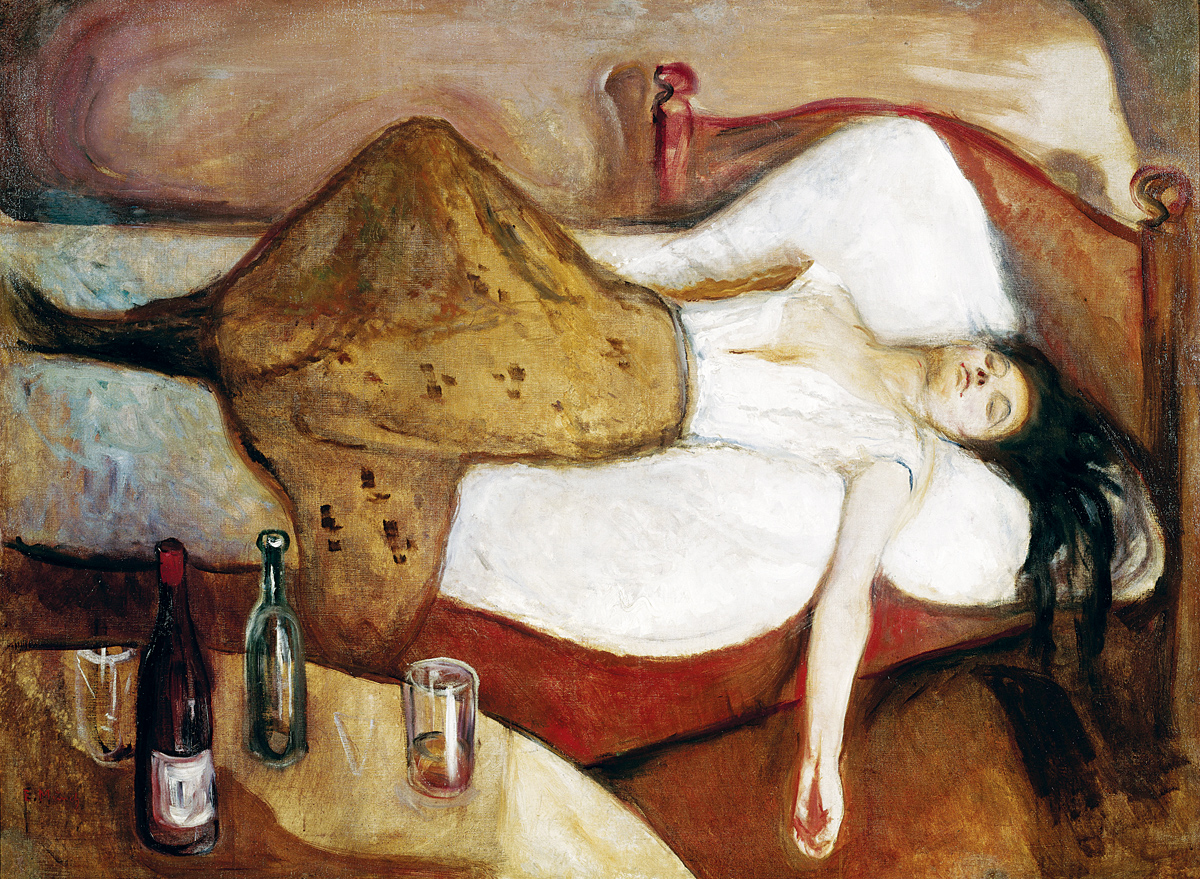Transits of Venus
The commodification of sex and love has shaped our attitudes toward both over the past half century, but eros is more than just dollars and cents.
By Lewis H. Lapham

The Toilette of Venus (detail), by François Boucher, 1751. The Metropolitan Museum of Art, bequest of William K. Vanderbilt, 1920.
I used to be Snow White, but I drifted.
—Mae West
On assignment for The Saturday Evening Post in the summer of 1964, I accepted one of Mae West’s invitations “to come up and see me sometime,” and on the stage set that was her house in Malibu I found her in what both Giacomo Casanova and Cecil B. DeMille would have recognized as a “boudoir”—white fur rug, gilded mirrors, satin hangings on the walls; Miss West arranged on the bed wearing a lace negligee, a feather boa, and a pink silk nightgown. She was seventy-one years old, and if she had drifted a long way from the cottage in the forest with the seven dwarves, she had lost nothing of her power to cue the saxophones and stand to attention the members of a cavalry regiment.
She granted me an audience that lasted maybe an hour, which was time enough to count the ways in which she was a contrivance as finely wrought as one of Emily Dickinson’s love lyrics or her own extravagantly blond wig. The curtains had been drawn against the bright, blue California afternoon, but the dim light softened with the scent of roses couldn’t conceal the lines around her eyes and wrists, the wrinkles at her throat, the strain on the corsets that held her figure as rigidly in place as a pagan idol carved in ivory. After ten minutes the imperfections in her appearance were no longer visible. Whether it was art or biology, her letting slip the sleeve of her negligee or the gene sequence encoded in her elbow, so distinct was the sensual inducement that had she directed me to climb the stairway to paradise, I would have gone as willingly as Tristan to Isolde, or Napoleon to Joséphine. Miss West didn’t entertain questions. She spoke as if from an altar or a throne, revealing what she deemed to be within reach of a masculine—and, therefore, limited—intelligence. One took what one was given and was grateful, and it wasn’t until several hours later, reading through my notes in the bar of the Beverly Hills Hotel, that I understood what it was that Miss West had allowed me to see. If she was a force of nature, she was also a work of the imagination, her own as well as that of the company of the elect admitted to her dressing room or her anatomy. Her face never could have been thought beautiful, even at the age of seven in 1900, when she made her debut on the Brooklyn vaudeville stage. Her voice was as rough as sandpaper, her terms of endearment as blunt as stone. How, then, did she float the veil of seduction, and of what was it composed?
My notes suggested an answer having more to do with the spirit than the flesh, not with the bird in the hand but with the seventeen in the bush. “Sex,” she had said, “is like a small business; you gotta protect it, watch over it,” manage the market in desire as a midsummer night’s dream in the forest of Arden, somewhere just over Dorothy’s rainbow or around the next bend in the Missouri River. Forget that what is afoot is a chasing of butterflies never to be caught and you lose sight of the bluebirds, miss the point of the joke—mistakes, Miss West said, that she had been careful to avoid. Over the course of a life that she construed as a transit of Venus, she hadn’t bothered to count the number of lovers who had come and gone with the leaves of autumn and the flowers of spring. “The score never interested me,” she said, “only the game.” The constellation of Eros as seen in the Hollywood sky after 1950 she thought sadly lacking in glamour. “The women just walk around on a stage lookin’ dirty,” she said. “Where’s the humor? Where’s the laugh in back of it?”
In 1964 America’s snow-white homecoming queens hadn’t yet drifted downstream on their parade floats into the saturnalian whirlpool of 1968, but the country’s moral fabric was said to be showing signs of wear and tear—Bob Dylan and the Beatles singing on the radio; the birth control pill in the hands of cocktail waitresses, nymphs, and satyrs hanging out around the birdbaths on suburban lawns. Concerns bearing on the lure of sex were headline news, which was why The Saturday Evening Post, in those days still a national voice of bourgeois stability, was sending its scouts in all directions to look for signs of the great god Pan slouching toward Nashville to cut a record with Circe and the three sirens.
I didn’t count myself particularly well-qualified for the task at hand. Having come of age in the late forties, I’d been reliably informed, on the authority of Rudyard Kipling and in accordance with the wisdom of the Anglican church, that body and soul didn’t go to the same dancing classes. What I could see of the American way of life at the time confirmed the ruling. At the movies husbands and wives couldn’t be seen occupying the same bed, and children were brought into the world by storks. Booksellers banned the sale of novels depicting either the hero or the heroine in a state of wanton undress; to publish a picture of a pubic hair was a criminal offense; a woman’s place was in the home; and sex was something that happened in France.
At a New England boarding school and college in the mid-fifties it was disclosed that sex had also been known to occur in eighteenth-century England and in imperial Rome. Students interested in more recent source material were referred to pinups of Marilyn Monroe, the novels of James Joyce (on the understanding that Molly Bloom wasn’t the kind of girl one invited to the prom) and to the dime-a-dance ballrooms in the shadow of Times Square. Although my postgraduate work had included courses of study in Greenwich Village and its extension in San Francisco’s North Beach—in the red-light districts of Paris, London, and Hamburg and their adjuncts in the confessions of Thomas De Quincey and Henry Miller—by the summer of 1964 I hadn’t solved the riddle situated in the story of Héloïse and Peter Abélard, and I was no more at ease with the questions posed by my editors in New York—what is sex, and where is love—than was the blonde under the broad-brimmed straw hat seated next to me at the bar in the Beverly Hills Hotel curious to know whether I was looking for company. She was easily fifty years younger than Miss West, a high-end daughter of joy deserving the adjectives that greengrocers assign to the grapefruit and the plums, but there was no laughter in the back of her voice or her eyes, and if I’d learned anything from the goddess in her temple on the beach at Malibu, it was that if there’s no play of the mind, there’s no game in Master John Thursday.

The Day After, by Edvard Munch, 1886. National Gallery, Oslo, Norway.
The observation is in line with those of Dante Alighieri, by Thomas Mann, and by David Foster Wallace, but it stands at odds with the transformations of Eros into a consumer product that followed from the excitements of the sixties sexual revolution. The opening of Pandora’s box had let loose too many freedoms of the spirit—believed to be pagan and seen to be dangerous—threatening to reconfigure the society’s Christian seating arrangements. As a solution to the problem of redeploying the country’s overabundant supply of sexual energy, it was thought best to classify it as a commodity somehow akin to breakfast cereal or unleaded gasoline. The policy tabled the questions stored in the hope chest of America’s family values (what is moral and where is virtue?) and by so doing opened the market in desire to development well beyond the powers of Miss West to watch over and protect. Eros borne aloft on the wings of commerce licensed any and all uses of the brand name that could be turned to a profit—as romance, lust, neurosis, courtly love, gay and lesbian alliance, adultery, alternative marriage, forbidden apple and low-hanging fruit. In the gardens of tabloid delight the vendors of freshly picked gossip offer the sweetmeats of both prudery and prurience, the front-page political reporting replicates the classified advertising placed by men seeking women and women seeking men, the editorial pages sing their songs of spring with lyrics supplied by a congressional committee or the police. From every orifice of the media (movie and television screen, newsstand, cosmetic counter, roadside billboard), the sales promotions pour forth at all hours of the day and night, enfolding their multiple target audiences in a haze of pornographic and quasipornographic images intended to move the merchandise instead of the head or the heart—the
Song of Solomon scored for violin and lawn mower, for evening gown and aluminum roof.
It not always being understood that one is expected to look but not touch, to give way to one’s passion not in the automobile but in the automobile showroom, the packaging of Eros as both a liquid and a powder (freeze-dried and chocolate-flavored, as a Valentine’s Day card and a pedophile website) has been good for business but apparently not so good for the emotional health and happiness of the dream-buying public. The commercial applications beat the life out of the enterprise, and with it Ovid’s merry sensuality as well as Plato’s hope of meaning. The reports published in both the literary and scientific press read like the filings of a customer complaint. Having bought what was sold on the guarantee of a safe and quick passage to the islands of bliss, the purchasers of the product find themselves occupying a luxury suite in hell, and they wish to return the experience for store credit. Similarly with the assurances of enhanced performance, both highway and off-road, that come with the cosmetic surgeries and the rejuvenating chemicals—the warranty doesn’t cover the losses of self-esteem induced by the thrilling heart attack supplied at no extra cost with the penile implant.
The disappointments follow from the belief that sex and money trade in the same market and that between them it’s possible to set some sort of reliable exchange rate. Fortunately for the future of the human race, the notion is ridiculous. Eros is more nearly matched to his description in ancient Greek myth—offspring of the wind and black-winged night, the double-sexed progenitor of the universe—than with a tabulation of the receipts from the Christmas sales on Madison Avenue and Rodeo Drive. In the same way that bad money chases good money into exile or hiding, the erotic additives and synthetics depress the market in midsummer night dreams. This issue of Lapham’s Quarterly is intended to put Miss West’s bluebirds back in the sky. The contributors sing the old song as first written in the language of laughter or tears, speak to the unions of body and soul dancing to the music of time.




